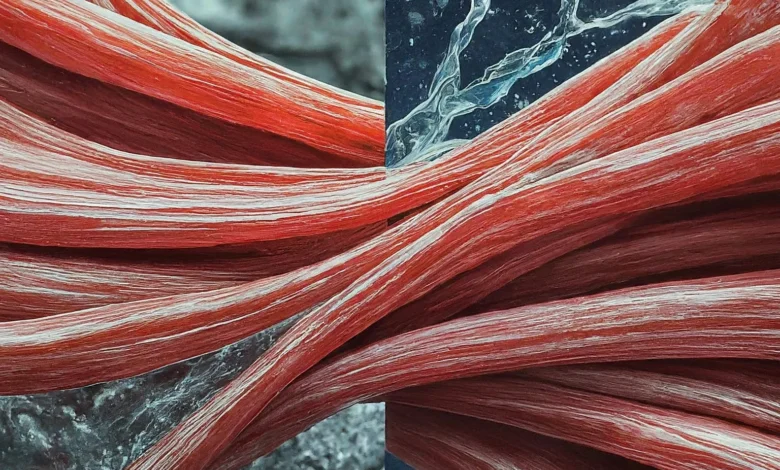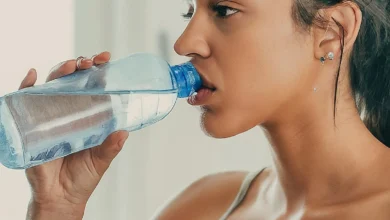The Role of Hydration in Muscle Recovery and Growth

Did you know that your muscles are about 79% water? It’s true! Water plays a crucial role in nearly every bodily function, but its impact on muscle health is often overlooked. Whether you’re a seasoned athlete or just starting your fitness journey, understanding the connection between hydration and muscle recovery could be the key to unlocking your full potential.
In this article, we’ll dive deep into the fascinating world of hydration and muscle health. You’ll discover how proper hydration can boost your performance, speed up recovery, and even help you build stronger muscles. So, grab a glass of water and let’s explore how this simple habit can transform your fitness results!
Why Hydration Matters for Muscles
Water isn’t just important for quenching your thirst – it’s essential for your muscles to function properly. Here’s why:
- Nutrient Transport: Water helps carry vital nutrients to your muscle cells, fueling their growth and repair.
- Waste Removal: It flushes out toxins and waste products that can build up during exercise.
- Temperature Regulation: Proper hydration helps your body maintain an optimal temperature during workouts.
- Joint Lubrication: Water keeps your joints well-lubricated, reducing the risk of injury during exercise.
When you exercise, your muscles contract and relax repeatedly. This process relies heavily on proper hydration. Dehydrated muscles can’t perform at their best, leading to decreased strength, reduced endurance, and a higher risk of injury.
The Science Behind Hydration and Muscle Recovery
Let’s get a bit scientific for a moment. When you exercise, especially intensely, your muscles experience micro-tears. Don’t worry – this is a normal part of the muscle-building process! These tiny tears are what allow your muscles to grow back stronger. But here’s the catch: proper hydration is crucial for this repair process.
Water plays several key roles in muscle recovery:
- Protein Synthesis: Adequate hydration is necessary for the process of protein synthesis, which is how your body builds new muscle tissue.
- Reduced Inflammation: Well-hydrated muscles experience less inflammation, leading to faster recovery times.
- Nutrient Delivery: Water helps transport essential nutrients like amino acids to your muscles, aiding in repair and growth.
- Waste Removal: Proper hydration helps flush out metabolic waste products that can accumulate during exercise and slow down recovery.
To illustrate this, imagine your muscle cells as tiny factories. Water acts as both the supply trucks (bringing in nutrients) and the garbage trucks (removing waste). Without enough water, these factories can’t operate efficiently, slowing down your muscle recovery and growth.
| Hydration Level | Muscle Cell Function |
|---|---|
| Well-hydrated | Optimal nutrient delivery, efficient waste removal, rapid recovery |
| Mildly dehydrated | Reduced nutrient transport, slower waste removal, delayed recovery |
| Severely dehydrated | Impaired nutrient delivery, toxin buildup, significantly hindered recovery |
By maintaining proper hydration, you’re giving your muscles the best possible environment to recover and grow stronger. In the next section, we’ll explore how to recognize the signs of dehydration, so you can stay on top of your hydration game.
Signs of Dehydration During and After Exercise
Staying hydrated is crucial, but how do you know if you’re falling short? Your body has several ways of signaling that it needs more water. Being aware of these signs can help you maintain optimal hydration for muscle recovery and growth.
Here are some common symptoms of dehydration to watch out for:
- Thirst: This is your body’s most obvious way of telling you to drink up.
- Dark Urine: Well-hydrated individuals have light yellow or clear urine. If yours is dark yellow or amber, it’s time to drink more water.
- Fatigue: Feeling unusually tired during or after your workout could be a sign of dehydration.
- Muscle Cramps: These painful contractions are often linked to dehydration and electrolyte imbalances.
- Dizziness or Headache: These can occur when your body doesn’t have enough fluids to maintain proper blood flow.
- Dry Mouth and Lips: If your mouth feels sticky or your lips are chapped, you might be dehydrated.
It’s important to note that these signs relate directly to muscle recovery. When you’re dehydrated, your body struggles to deliver nutrients to your muscles and remove waste products. This can significantly slow down the recovery process and hinder muscle growth.
Remember, by the time you feel thirsty, you’re already mildly dehydrated. That’s why it’s crucial to drink water regularly throughout the day, not just during your workouts.
How Proper Hydration Enhances Muscle Growth
Now that we understand the importance of hydration for muscle recovery, let’s explore how it specifically enhances muscle growth. The process is fascinating and might just motivate you to reach for that water bottle more often!
Key Benefits of Proper Hydration for Muscle Growth:
- Improved Protein Synthesis: Water plays a crucial role in the process of protein synthesis, which is essential for building new muscle tissue. When you’re well-hydrated, your body can more efficiently use the proteins you consume to repair and grow muscles.
- Enhanced Nutrient Delivery: Proper hydration ensures that your bloodstream can effectively transport nutrients like amino acids and glucose to your muscle cells. This means your muscles get the fuel they need to grow and recover.
- Optimal Hormone Balance: Staying hydrated helps maintain the proper balance of hormones in your body, including those crucial for muscle growth like testosterone and growth hormone.
- Increased Cell Volumization: When your muscle cells are well-hydrated, they become fuller and more voluminous. This not only makes your muscles look bigger but can also trigger further growth.
- Better Workout Performance: Proper hydration allows you to perform better during your workouts, lifting heavier weights or completing more reps, which in turn stimulates more muscle growth.
The Role of Water in Protein Synthesis
Protein synthesis is the process by which your body builds new proteins, including those needed for muscle growth. Water is essential for this process because it:
- Helps transport amino acids (the building blocks of protein) to your muscle cells.
- Facilitates the chemical reactions necessary for protein synthesis.
- Aids in removing waste products produced during protein synthesis.
Without adequate hydration, protein synthesis slows down, potentially limiting your muscle growth even if you’re consuming enough protein.
By maintaining proper hydration, you’re creating an optimal environment for muscle growth. In the next section, we’ll discuss specific strategies to ensure you’re getting enough water to support your muscle-building goals.
Optimal Hydration Strategies for Muscle Recovery
Now that we understand the importance of hydration for muscle recovery and growth, let’s dive into practical strategies to keep your body well-hydrated before, during, and after your workouts.
Pre-Workout Hydration
Preparing your body with adequate hydration before exercise is crucial for optimal performance and recovery. Here are some guidelines:
- Drink about 16-20 ounces of water 2-3 hours before your workout.
- Consume an additional 8-10 ounces 10-20 minutes before starting your exercise.
- If you’re exercising early in the morning, focus on hydrating well the night before.
During-Workout Hydration
Staying hydrated during your workout helps maintain performance and sets the stage for faster recovery. Follow these tips:
- Aim to drink 7-10 ounces of water every 10-20 minutes during exercise.
- For intense workouts lasting over an hour, consider a sports drink to replenish electrolytes.
- Listen to your body – if you feel thirsty, drink!
Post-Workout Hydration
Proper hydration after your workout is critical for muscle recovery. Here’s what to do:
- Weigh yourself before and after your workout. For every pound lost, drink 16-20 ounces of water.
- Aim to consume about 20-24 ounces of water for every hour of exercise.
- Include water-rich foods in your post-workout meal, such as fruits and vegetables.
Here’s a handy table showing recommended fluid intake based on exercise duration and intensity:
| Exercise Duration | Low Intensity | Moderate Intensity | High Intensity |
|---|---|---|---|
| 30-60 minutes | 16-20 oz | 20-24 oz | 24-32 oz |
| 60-90 minutes | 20-24 oz | 24-32 oz | 32-48 oz |
| 90+ minutes | 24-32 oz | 32-48 oz | 48-64 oz |
Remember, these are general guidelines. Your individual needs may vary based on factors like climate, body size, and sweat rate.
Beyond Water: Electrolytes and Muscle Function
While water is crucial, it’s not the only player in the hydration game. Electrolytes are equally important for muscle function and recovery. Let’s explore what electrolytes are and why they matter for your muscles.
What Are Electrolytes?
Electrolytes are minerals in your blood and other bodily fluids that carry an electric charge. They play a vital role in:
- Regulating nerve and muscle function
- Hydrating the body
- Balancing blood acidity and pressure
- Helping rebuild damaged tissue
Key Electrolytes for Muscle Function
Sodium:
- Helps maintain fluid balance
- Crucial for nerve impulse transmission and muscle contraction
- Lost through sweat during exercise
Potassium:
- Regulates heart rhythm
- Helps with muscle contraction
- Aids in preventing muscle cramps
Magnesium:
- Supports muscle and nerve function
- Helps regulate muscle contractions
- Plays a role in protein synthesis
Calcium:
- Essential for muscle contractions
- Helps with nerve signaling
- Supports bone health
Natural Sources of Electrolytes
Here’s a list of foods rich in these essential electrolytes:
- Sodium: Table salt, pickles, olives
- Potassium: Bananas, sweet potatoes, spinach
- Magnesium: Nuts, seeds, whole grains
- Calcium: Dairy products, leafy greens, fortified plant-based milk
For most people, a balanced diet provides sufficient electrolytes. However, if you’re engaging in intense or prolonged exercise, especially in hot conditions, you might need to supplement with sports drinks or electrolyte tablets.
By paying attention to both your water and electrolyte intake, you’re setting the stage for optimal muscle recovery and growth. In the next section, we’ll look at how hydration needs can vary depending on the type of exercise you’re doing.
Hydration Tips for Different Types of Exercise
Not all workouts are created equal, and neither are their hydration needs. Let’s explore how to tailor your hydration strategy to different types of exercise for optimal muscle recovery and growth.
Endurance Training
Endurance activities like long-distance running, cycling, or swimming require special attention to hydration. Here’s why:
- Extended duration increases the risk of dehydration
- Continuous sweating leads to significant fluid and electrolyte loss
Tips for endurance athletes:
- Start hydrating well before your session
- Aim to drink 4-6 ounces of water every 15-20 minutes during exercise
- For sessions lasting over 90 minutes, use a sports drink to replenish electrolytes
- Practice your hydration strategy during training to find what works best for you
Strength Training
While you might not sweat as much as during cardio, proper hydration is crucial for maximizing strength and promoting muscle growth.
Tips for strength trainers:
- Drink water between sets to stay hydrated throughout your workout
- Aim for 3-4 ounces every 15-20 minutes
- Consider a BCAA (Branched-Chain Amino Acids) drink to support muscle recovery
- Don’t forget post-workout hydration to aid in muscle repair and growth
High-Intensity Interval Training (HIIT)
HIIT workouts are intense and can lead to rapid fluid loss through sweating. Proper hydration is key to maintaining performance and supporting recovery.
Tips for HIIT enthusiasts:
- Hydrate well before your session, as drinking during short, intense bursts can be challenging
- Take advantage of rest periods to sip water
- Aim for 6-8 ounces of water for every 15 minutes of high-intensity exercise
- Focus on rehydrating post-workout to aid recovery
Remember, regardless of your exercise type, listen to your body. If you feel thirsty, drink water. It’s always better to stay ahead of dehydration rather than trying to catch up.
Common Myths About Hydration and Muscle Recovery
There’s a lot of information out there about hydration and muscle recovery, but not all of it is accurate. Let’s debunk some common myths to ensure you’re on the right track.
Myth 1: “If you’re not thirsty, you don’t need to drink water.”
Truth: Thirst is actually a sign that you’re already mildly dehydrated. By the time you feel thirsty, your performance may already be declining. It’s best to drink water regularly throughout the day and during exercise, even if you don’t feel thirsty.
Myth 2: “Sports drinks are always better than water for hydration.”
Truth: For most workouts lasting less than 60-90 minutes, water is sufficient. Sports drinks are beneficial for longer or more intense sessions where you need to replenish electrolytes. For regular gym sessions, plain water is usually your best bet.
Myth 3: “You can’t drink too much water.”
Truth: While rare, it is possible to drink too much water, leading to a condition called hyponatremia. This occurs when the sodium levels in your blood become diluted. Stick to recommended guidelines and listen to your body.
Myth 4: “Coffee and tea don’t count towards your daily fluid intake.”
Truth: While caffeine can have a mild diuretic effect, the fluid in coffee and tea does contribute to your overall hydration. However, water should still be your primary source of hydration.
Myth 5: “You only need to focus on hydration during your workout.”
Truth: Proper hydration is a 24/7 job. Your hydration status before you start exercising significantly impacts your performance and recovery. Focus on staying well-hydrated throughout the day, not just during workouts.
By understanding these myths and the truths behind them, you can make more informed decisions about your hydration strategy, ultimately supporting better muscle recovery and growth.
In the next section, we’ll discuss practical ways to monitor your hydration status, ensuring you’re always on top of your game.
Monitoring Your Hydration Status
Staying properly hydrated is crucial, but how can you tell if you’re hitting the mark? Let’s explore some practical methods to assess your hydration status, ensuring you’re giving your muscles the fluid support they need.
1. Urine Color Check
One of the simplest and most effective ways to monitor your hydration is by checking the color of your urine:
- Pale yellow to clear: You’re well-hydrated
- Dark yellow or amber: You need to drink more water
- Brown or tea-colored: You’re severely dehydrated and should increase fluid intake immediately
Pro tip: Keep a urine color chart in your bathroom as a quick reference guide.
2. Body Weight Changes
Weighing yourself before and after exercise can give you valuable insights:
- Weight loss after exercise indicates fluid loss through sweat
- For every pound lost, aim to drink 16-20 ounces of water to replenish
Remember, rapid weight loss after exercise is primarily water loss, not fat loss.
3. Thirst and Dry Mouth
While thirst isn’t the most reliable indicator (you’re already mildly dehydrated when you feel thirsty), it shouldn’t be ignored. If you’re feeling thirsty or have a dry mouth, it’s time to drink up.
4. Skin Elasticity Test
Gently pinch the skin on the back of your hand:
- If it snaps back quickly, you’re likely well-hydrated
- If it takes time to return to normal, you might be dehydrated
5. Advanced Techniques
For athletes or those needing more precise measurements:
- Urine Specific Gravity (USG) Tests: These can be done with at-home test strips
- Sweat Rate Calculations: More complex but can provide valuable data for endurance athletes
By regularly checking these indicators, you can stay on top of your hydration game, supporting optimal muscle recovery and growth.
Conclusion
We’ve journeyed through the fascinating world of hydration and its crucial role in muscle recovery and growth. Let’s recap the key points:
- Proper hydration is essential for muscle function, recovery, and growth
- Water plays a vital role in nutrient delivery, waste removal, and protein synthesis
- Recognizing signs of dehydration is crucial for maintaining optimal performance
- Tailoring your hydration strategy to your specific type of exercise can enhance results
- Electrolytes are just as important as water for muscle function and recovery
- Monitoring your hydration status helps ensure you’re always adequately hydrated
Remember, staying hydrated isn’t just about drinking water during your workouts. It’s a continuous process that requires attention throughout your day. By implementing the strategies we’ve discussed, you’re setting yourself up for better workouts, faster recovery, and more efficient muscle growth.
So, the next time you’re pushing through a tough workout or focusing on building those muscles, don’t forget about your humble water bottle. It might just be the secret weapon you need to take your fitness journey to the next level.
Your action steps:
- Start monitoring your daily water intake
- Implement pre, during, and post-workout hydration strategies
- Pay attention to your body’s hydration signals
- Incorporate electrolyte-rich foods into your diet
Here’s to staying hydrated and achieving your fitness goals! Remember, a well-hydrated body is a high-performing body. Cheers to your health and your muscles!
Stay hydrated, stay healthy, and keep pushing towards your fitness goals!



